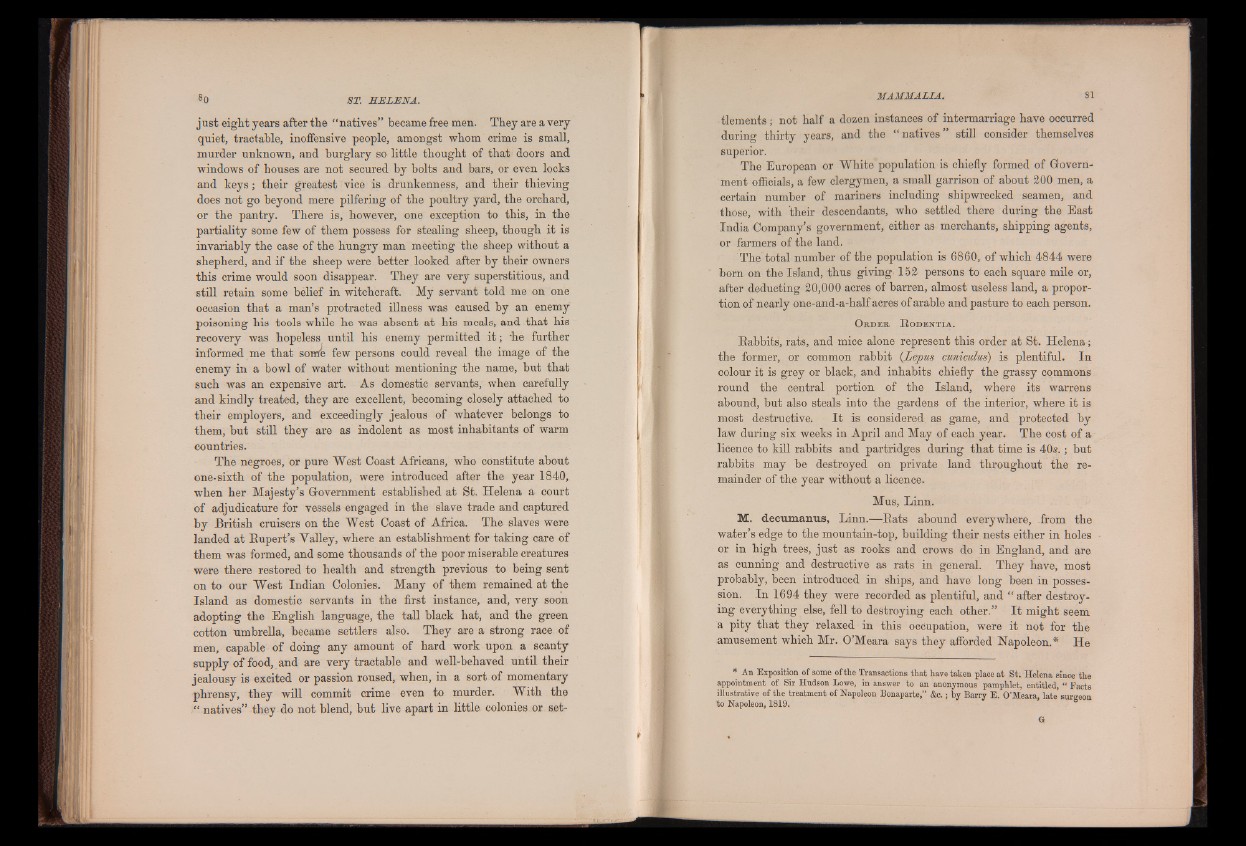
just eight years after the “natives” became free men. They are a very
quiet, tractable, inoffensive people, amongst whom crime is small,
murder unknown, and burglary so little thought of that doors and
windows of houses are not secured by bolts and bars, or even locks
and keys; their greatest vice is drunkenness, and their thieving
does not go beyond mere pilfering of the poultry yard, the orchard,
or the pantry. There is, however, one exception to this, in the
partiality some few of them possess for stealing sheep, though it is
invariably the case of the hungry man meeting the sheep without a
shepherd, and if the sheep were better looked after by their owners
this crime would soon disappear. They are very superstitious, and
still retain some belief in witchcraft. My servant told me on one
occasion that a man’s protracted illness was caused by an enemy
poisoning his tools while he was absent at his meals, and that his
recovery was hopeless until his enemy permitted i t ; 'he further
informed me that some few persons could reveal the image of the
enemy in a bowl of water without mentioning the name, but that
such was an expensive art. As domestic servants, when carefully
and kindly treated, they are excellent, becoming closely attached to
their employers, and exceedingly jealous of whatever belongs to
them, but still they are as indolent as most inhabitants of warm
countries.
The negroes, or pure West Coast Africans, who constitute about
one-sixth of the population, were introduced after the year 1840,
when her Majesty’s Government established at St. Helena a court
of adjudicature for vessels engaged in the slave trade and captured
by British cruisers on the West Coast of Africa. The slaves were
landed at Bupert’s Talley, where an establishment for taking care of
them was formed, and some thousands of the poor miserable creatures
were there restored to health and strength previous to being sent
on to our West Indian Colonies. Many of them remained at the
Island as domestic servants in the first instance, and, very soon
adopting the English language, the tall black hat, and the green
cotton umbrella, became settlers also. They are a strong race of
men, capable of doing any amount of hard work upon a scanty
supply of food, and are very tractable and well-behaved until their
jealousy is excited or passion roused, when, in a sort of momentary
phrensy, they will commit crime even to murder. With the
.“ natives” they do not blend, but live apart in little colonies or se-ttlements;
not half a dozen instances of intermarriage have occurred
during thirty years, and the “ natives” still consider themselves
superior.
The European or White population is chiefly formed of Government
officials, a few clergymen, a small garrison of about 200 men, a
certain number of mariners including shipwrecked seamen, and
those, with their descendants, who settled there during the East
India Company’s government, either as merchants, shipping agents,
or farmers of the land.
The total number of the population is 6860, of which 4844 were
born on the Island, thus giving. 152 persons to each square mile or,
after deducting 20,000 acres of barren, almost useless land, a proportion
of nearly one-and-a-half acres of arable and pasture to each person.
O r d e r B o d e n t ia .
Babbits, rats, and mice alone represent this order at St. Helena;
the former, or common rabbit {Lepus cuniculus) is plentiful. In
colour it is grey or black, and inhabits chiefly the grassy commons
round the central portion of the Island, where its warrens
abound, but also steals into the gardens of the interior, where it is
most destructive. I t is considered as game, and protected by
law during six weeks in April and May of each year. The cost of a
licence to kill rabbits and partridges during th a t time is 40s.; but
rabbits may be destroyed on private land throughout the remainder
of the year without a licence.
Mus, Linn.
M. decumanus, Linn.—Bats abound everywhere, from the
water’s edge to the mountain-top, building their nests either in holes
or in high trees, just as rooks and crows do in England, and are
as cunning and destructive as rats in general. They have, most
probably, been introduced in ships, and have long been in possession.
In 1694 they were recorded as plentiful, and “ after destroying
everything else, fell to destroying each other.” I t might seem
a pity that they relaxed in this occupation, were it not for the
amusement which Mr. O’Meara says they afforded Napoleon.* He
* An Exposition of some of the Transactions that have taken place at St. Helena since the
appointment of Sir Hudson Lowe, in answer to an anonymous pamphlet, entitled, “ Facts
illustrative of the treatment of Napoleon Bonaparte," &c.; by Barry E. O’Meara, late surgeon
to Napoleon, 1819.
G